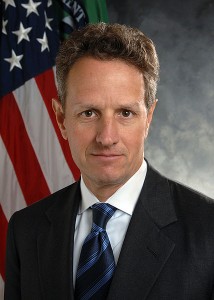Last week, we reported that former United States Treasury Secretary Timothy Geithner published an op-ed piece in the Wall Street Journal and appeared on MSNBC defending the Bush and Obama administrations’ bailouts of the financial industry. He presented the case that it was a necessary endeavor and that, although mistakes were made, it was important to avoid a second Great Depression.
Writing an op-ed in Fortune magazine Monday, Sheila Bair, former chair of the Federal Deposit Insurance Corporation (FDIC), accused Geithner of having it all wrong. Bair wrote that Geithner’s new book “Stress Test” has incited a new round of debate to conclude if the financial system should be founded upon a series of bailouts or accountability.
Bair, the author of “Bull by the Horns” and “Fighting to Save Main Street from Wall Street,” stated that a majority of Americans favor a system of accountability, but “Washington’s love affair with big finance continues.”
 She argued that any efforts to reform the system have been inadequate. “The hard work to force mega-banks to raise more capital, replace their unstable short-term funding with long-term debt and simplify their legal structures is at best, half-done.”
She argued that any efforts to reform the system have been inadequate. “The hard work to force mega-banks to raise more capital, replace their unstable short-term funding with long-term debt and simplify their legal structures is at best, half-done.”
The former FDIC head said that the former Treasury Secretary has conceded that he’s not concerned about continuing with the “too big to fail” measure for financial institutions. Bair is worried that Geithner’s inability to recognize that instability is generated when Wall Street thinks it can control the federal government.
“He accepts the risks of moral hazard when it comes to bailing out homeowners, but not the mega-banks. He almost naively assumes that the titans of Wall Street can somehow rise above the temptation to take outsized risks when they know the government will always be there to bail them out,” Bair noted. “Tim’s justification of the bailouts is based on a false dilemma: that our only choices were either to do nothing or to pursue the over-the-top measures, which we did.”
Bair concluded that she would feel a lot better if Geithner was in favor of avoiding bailouts in the future. Instead of supporting genuine reforms, wrote Bair, Geithner thinks Washington has done it can or should do.
“I think we should apologize for the bailouts. He wants to be thanked for them,” Bair ended the op-ed. “But if we glorify regulators when they bail out the industry, while savaging them when they try to regulate it, what kind of system will we have?”
Bair isn’t the first one to oppose Geithner or the bailouts. As we reported, David Stockman, former Reagan budget director and author of “The Great Deformation,” called Geithner a “bag carrier for Wall Street.”
In 2010, then-Texas Republican Congressman and three-time presidential candidate Ron Paul called for the administration to fire Geithner for his involvement in the AIG bailout scandal, and noted that it was another example of why the Federal Reserve should be stripped of its powers and must be audited.
“These banks should have suffered the consequences of the huge risks they were taking,” stated Paul. “After all, they kept plenty of rewards when times were good. Instead, the Fed found a way to socialize these major losses so these banks could survive and continue making more bad decisions, at the expense of the American people and the value of the dollar.”
Paul accused Geithner of having aided the banks from hiding the fact from taxpayers that the banks were compensated for bad decisions.



